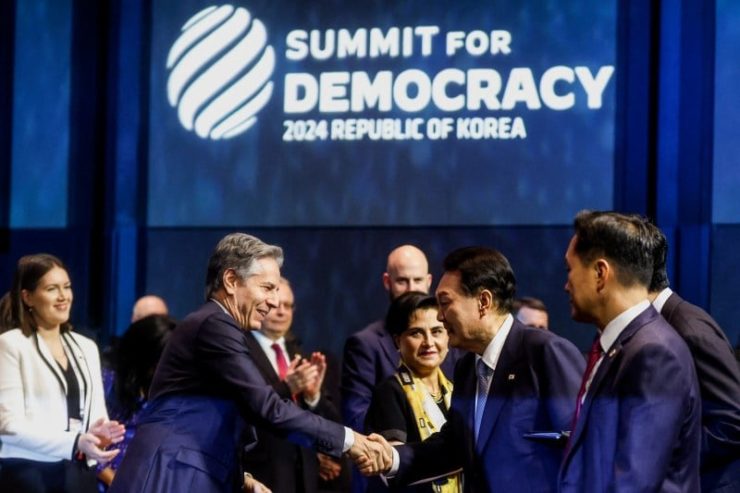
The Third Summit for Democracy, a US-led initiative, was conducted in Seoul from 18th to 20th March 2024. The initiative was promised by the incumbent US President Joe Biden in his 2020 election campaign. Rapidly declining democracy around the world led to the urgency and cruciality of this summit. Representatives from over 30 countries attended this summit. The apparent rationale behind convening the recent summit was to provide a forum to promote democratic norms. The summit sought to address the accentuating challenges and issues that are leading to a sharp decline in democracy around the world. Moreover, reinforcing the democratic principles to ensure human rights and freedom to halt the degeneration of democracy was also one of the key agendas of the summit. Human rights, media freedom, and electoral integrity amid the advancement of technology were the prominent topics discussed at the conference. However, the events at the summit demonstrate that the summit had a clandestine agenda of maligning the rival nations of the United States.
The US and its allies’ dominance over the summit sparked criticism regarding the politicization of the summit. The events at the summit show that instead of laying down principles to foster democratic norms around the world, the underlying agenda of this conference was to further US geopolitical interests. The environment of the summit depicted that it was more an effort to rejuvenate the rapidly waning US hegemony around the globe. Antony Blinken, the US Secretary of State, singled out China and Russia for misusing media and technology to spread fake news around globally. He accused Russia and China for manipulating information globally. Blinken held that is buying media outlets in Southeast Asia and Africa to propagate Chinese propaganda across the continents. He also accused Russia of thwarting global support for Ukraine by laundering media agencies in the Latin America.
Overall, the summit seemed to be orchestrated to serve as a platform to tarnish the accentuating soft image of Russia and China among the developing countries. The United States and its allies attempted to malign the rivals of the United States, but they were silent over the crimes committed by the United States and Israel in Gaza. Blinken seemed worried about the plight of the Ukrainian people, but he, along with other speakers at the summit, turned a blind eye towards the innocent Palestinian civilians being bombarded discriminately by its ally. The Western media has been aptly accused of biased reporting of the events in the persistent Israeli genocide in Gaza. The Western media is constantly misleading the global audience through specific reporting, tone, and language. Moreover, some of the famous Muslim journalists, including Mehdi Hasan, have been restricted by the western media on the basis of their neutral reporting of the Israel-Hamas war. However, the US and other participants of the summit stayed hushed on this.
The United States even vetoed the UN resolutions calling for a humanitarian ceasefire in Gaza thrice, despite the voting of the majority of the countries in the favor of the resolution. This veto by the United States has resulted in the killing of more than 31000 innocent Palestinians, including a huge number of women and children, and fomenting starvation and health catastrophe in Gaza. This demonstrates that the fundamental institution, the United Nations, established under the ideals of a US-led democratic system, itself lacks democracy in its framework. Moreover, participants of the summit also failed to mention that the unilateral decisions of the US and its interventionist policies since the culmination of the Cold War have played a pivotal role in the degenerating of democracy globally. Their only focus was to accuse the rising superpowers of the world, Russia and China.
Taiwan’s Digital Minister Audrey Tang was also invited to the summit in a private capacity, which is being widely seen as a gesture to alienate China indirectly. This move was reprimanded by China, holding that all the efforts for expanding space for the independence of Taiwan are doomed to fail. One of the contributing factors behind profound critique of China and Russia was the Western anxiety over the expansion of the BRICS. The global south is looking at the BRICS as a truly inclusive organization because, unlike the United Nations, no member country possesses any sort of dictatorial position. Moreover, all the member countries are free to take their foreign policy decisions. China and Russia’s pro-Palestine policy have also been lauded among the pro-Palestinian countries and people. Moreover, Putin’s anti-Islamophobic approach has further elevated the soft image of Russia among the Muslims around the world. The United States needs to prioritize addressing internal challenges to democracy. Trumps allegations of rigging in 2016 and 2020 elections have raised concerns about the plight of democracy in the United States. On the other hand, the participants of the summit must acknowledge that accusing merely the adversaries of the United States and the West while brushing aside the interventionist and dictatorial policies of the US will only politicize the forum, leading it to be ineffective.
Taut Bataut – is a researcher and writer that publishes on South Asian geopolitics, exclusively for the online magazine “New Eastern Outlook”.